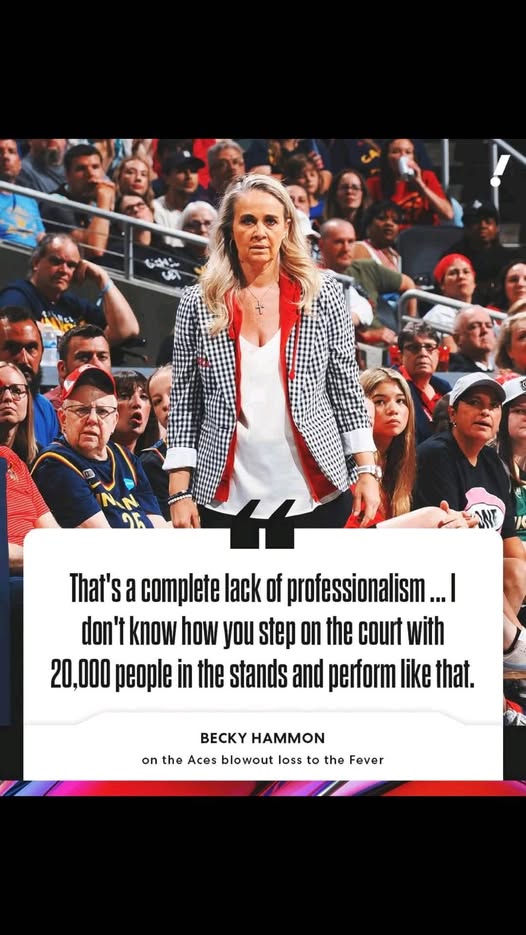The Las Vegas Aces landed in Indiana full of hope. Facing a Fever team without their star Caitlin Clark, expectations were high. Instead, the Aces suffered an 81–54 rout, with Indiana dominating on both ends and snapping a longstanding winless streak dating back to 2019. The performance wasn’t just a loss—it laid bare the limitations in effort, focus, and resilience that coach Becky Hammon unequivocally called out.
In the immediate aftermath, Hammon didn’t mince words. “One of the worst performances I’ve ever seen,” she declared, her tone sharp, her disappointment unmistakable. She labeled the outing as a “complete lack of professionalism” and said the team put forth more effort in practice than they did on the court. The stark contrast, she noted, was staggering: “They played better yesterday in practice by a lot,” she said. “I don’t know how you step onto the floor with 20,000 people in the stands and perform like that.” It was a blistering indictment of their mindset and execution .
Offensively, things were disastrous. The Aces shot a paltry 26.2 percent from the field, a figure Hammon described as “the worst offensive night” since she arrived four seasons ago. Only A’ja Wilson managed to shine, scoring 29 of the team’s 54 points. The rest of the rotation was a collective ghost, combining for a mere 25 points on 7-of-43 shooting—even Wilson’s dominance stood in bleak contrast to her teammates’ struggles .
Defensively, the performance was just as concerning. Indiana players repeatedly glided to uncontested layups and secured 50/50 balls. Hammon described the intensity on Indiana’s part as a “rugby match”—one in which her team refused to engage. “They were grabbing and holding us,” she said. “It’s a rugby match and my team doesn’t want to play rugby back and they get their ass kicked.”
Hammon didn’t hide from the blame. She acknowledged a clear lack of focus and fight. “The effort and the focus just were not there,” she said. “One team is three steps behind, one team is not. They got all the 50/50 balls. They busted our ass in every kind of way. There’s just no bones about it” . The comments painted a picture of a team out of sync, outclassed, and unwilling to respond to adversity.
By mid-fourth quarter, Hammon stopped the pain. She benched her starters with over six minutes remaining—an unmistakable signal that she was washing her hands of the performance. The bench, composed of Dana Evans, NaLyssa Smith, Kierstan Bell, Joyner Holmes, and Aaliyah Nye, clocked in the final minutes, unable to stem the tide .
This was not the first time this season that Hammon had questioned her squad’s heart. Earlier losses—including a blowout against Golden State—prompted her to voice concerns about a “heart issue.” She insisted, “I’m not going to coach effort. It’s one thing I can’t deal with. You are in charge of your effort.” In retrospect, she pointed to this loss in Indiana as confirmation that effort—not just talent or schemes—would decide the Aces’ identity .
Across reporting, analysts echoed her sentiment. Many described the Aces’ effort as “three quarters of trash”—a phrase that resurfaced repeatedly, underlining just how low the performance fell. ESPN’s coverage emphasized Hammon’s unequivocal call-out of professionalism, focus, and heart . Athlon Sports even mentioned Hammon labeling offense and defense alike as “trash,” adding that maybe, just maybe, this collapse spoke more to Las Vegas’s flaws than Indiana’s strength.
Beyond the loss itself, this moment hits in context. The Aces began the season aiming for a three-peat, riding on championships in 2022 and 2023. But cracks emerged. Hammon acknowledged distractions—the limelight, marketing, celebrity status—saying that such factors eroded focus and edge. She referenced elite teams overcoming heartache with renewed discipline, citing the Spurs’ 2014 reign after a devastating loss, drawing a parallel she hoped the Aces would follow .
Yet, after this Indiana drubbing, the parallels felt more unsettling than hopeful. Titles aren’t secured by talent alone—but by consistency in effort. The offseason’s nagging theme—edge, heart, professionalism—loomed larger than ever. The loss dropped Las Vegas to 8–9, and their footing in the Western Conference turned precarious. With an East Coast trip looming to face strong teams like Connecticut and New York, followed by an All-Star break, Hammon has a narrow window to salvage culture and execution.
But what did Hammon expect? A motivated trip against a wounded Fever squad—Indiana was missing Clark for the fourth straight game. Instead, they found a team playing with rhythm, intensity, and precision—riding high off their Commissioner’s Cup title. That contrast infuriated Hammon. “They just wanted it more than us,” she said simply . That’s the crux: desire can often outweigh talent—and in this instance, it did.
Hammon’s postgame was more than anger—it was a test. Calling it out, making it public, stripping the veneer of excuses. “If I knew which team was going to show up, I could prepare myself better,” she said . The message was clear: preparation matters, but preparation is pointless without buy-in. This drubbing in Indiana may have been intended as wake-up call—the kind only a coach willing to air disappointment so openly can issue.
A’ja Wilson, the MVP stalwart, emerged as the lone consistent force on offense. Outside of her, production was negligible. “One person scored more than two field goals… they just wanted it more than us,” Hammon said . This isn’t just about a player—it’s about standards. If effort is optional, excellence becomes impossible.
What comes next? The team’s response will define their season more than this loss. Hammon’s critique goes deep: professionalism, focus, heart. She’s laid bare the expectations. No fluff, no spin. Just raw accountability. If Las Vegas answers—if they inject that missing aggression and toughness—they could still steer their ship. But if this outing is a symptom of deeper malaise, that comeback may be far steeper.
In press conferences past, Hammon praised her players’ talent. But talent alone does not win games—and she’d made that clear. Now, as the Aces board their flight east, the weight of this message will follow. This isn’t just a reprimand—it’s a mirror. They saw the reflection: flat, disengaged, beaten. The question now is whether they’ll embrace change.
For fans and analysts, this moment stands as a pivotal point. A team with championship DNA, toppled by intensity and effort. A coach willing to call it as she saw it, no sugar-coating. And a roster facing an uncomfortable truth: to climb again, they must dig deeper. They must match seriousness with seriousness, energy with energy, focus with focus.
Becky Hammon didn’t hold back—and perhaps, that honesty was exactly what the Aces needed. If this blowout serves as a catalyst for recalibration, maybe Indiana will be remembered not just as a loss, but as the day the Aces remembered how to fight. But if no change comes, this could mark a turning point—one where effort no longer offsets strategy, where heartlessness eclipses talent, where an unchecked culture steeped in complacency erodes even the brightest rosters.
Only time will tell if this stinging defeat sparks resurgence—or confirms deeper cracks. But whatever happens next, Hammon’s words are etched: professionalism is mandatory. Focus is non-negotiable. Effort is essential. She burned the blueprint tonight. Now the players must decide if they’ll follow it—or let it dissipate into silent regret.



